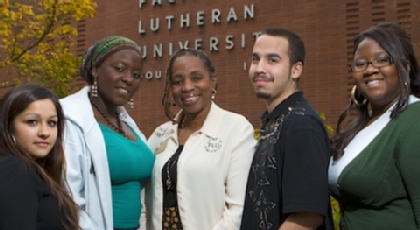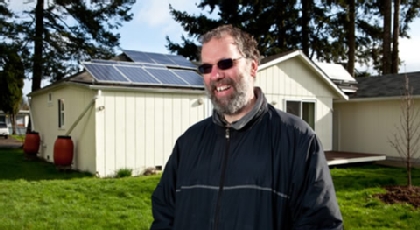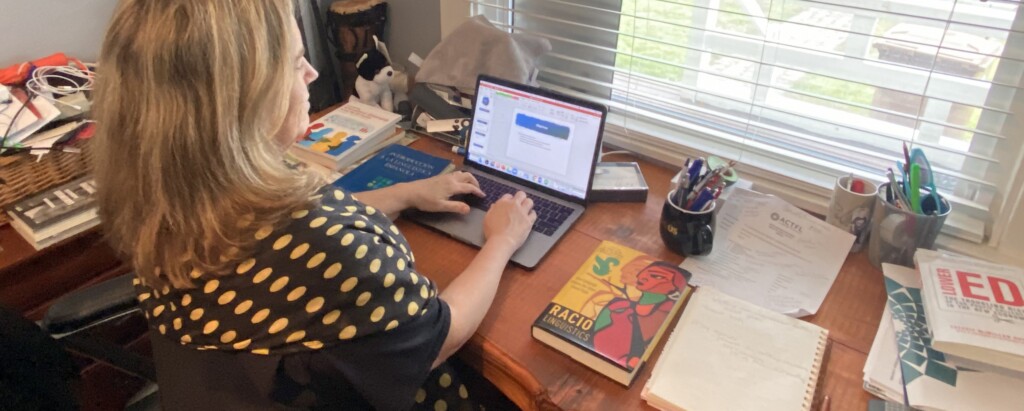Page 261 • (3,316 results in 0.056 seconds)
-

” sign. Students network in an event with professionals. A professor projects sheet music to a class.] Laurie: that makes them good problem solvers and good communicators and able to apply their knowledge in a broad range of settings. [video: Clips continue, Nathan’s voice comes in. A shot from above of a tall clock structure on PLU’s campus.] Nathan: It’s that liberal arts background [video: Return to Nathan.] Nathan: that really made me successful throughout my career, as I found it was equally
-
performance in the following areas: Course Work: A minimum 3.50 grade point average in all chemistry courses taken at PLU. Written Work: At time of declaration of the chemistry major, all copies of outstanding work (e.g., laboratory, seminar and research projects) need to be maintained by the student for later faculty evaluation for departmental honors. Oral Communication: Students must evidence ability to communicate effectively as indicated by the sum of their participation in class discussion, seminars
-
, which Beth describes as “an effort to change the atmosphere around educating for the purpose of equity and inclusion at PLU, with queer-identified folks at the center of that, for that particular part of the process.” The reactions to their announcement were mixed across campus, though not completely unexpected, at least according to Beth. She had felt and found it to be the case that “particularly young adults, students, would be far less likely to be committed to anti-queer prejudice,” though not
-
fryer at Crave is dedicated gluten-free with dedicated color-coded baskets so fries, tater tots and breakfast potatoes are all made in this fryer also when we have tostadas at Cross Cultures the corn tortillas are fried in here Dedicated gluten-free saute pans and utensils Dedicated gluten-free cutting boards and knives Staff trained in preventing cross-contamination they will change gloves when you request items such as a burger on a gluten-free bun at Crave or gluten-free bread at Tamari, etc
-
. They also consider how human communities have shaped and been shaped by their environment and how these relationships have changed over time. Students select two courses (from two different departments) from the following: ANTH 368: Edible Landscapes, The Foraging Spectrum (4) ECON 215: Investigating Environmental & Economic Change in Europe, Pre-req: ECON 101 or 111 (4) ECON 313: Environmental Economics, Pre-requisite: ECON 101 or 111 (4) HIST 370: Environmental History of the US, Pre-req
-
portion: $1,126 per credit hour (37 credits) Nursing program fee: $10,455 (subject to change) Additional fees may include: Additional fees include: technology fee ($270/year), wellness fee ($110/year), a one-time matriculation fee ($205), background check ($70), books and materials for coursework, uniform cost ($200), equipment ($100), laptop (not Chromebook). Students will have the option to choose between the Clinical Nurse Leader (CNL) or Certified Nurse Educator (CNE) track. ELMSN 2024 Tuition
-

, as the old joke goes, the extent of diversity on campus, was Swedes, Danes and Norwegians. But as the university began to grow, both in student population and in recognition, the make-up of the student population began to change. A lot of this has to do with PLU’s history. PLU always had an international focus inasmuch as it was very connected to Norway. By the late ’70s, things were beginning to fundamentally change – PLU was becoming more globally focused. By the early ’80s, according to Phil
-

background may have influenced his decision to move forward with this process. Either way, he said Tegels and many other clients don’t just follow through with net metering for the personal benefits. “Most homeowners don’t do it for financial reasons,” Burkhartzmeyer said. “They do it because they feel like they’re helping prevent climate change.” More involvement in sustainable living is on the way for Tegels. He is currently preparing to install a hot water panel, which is designed to minimize
-

technology for language teaching and learning one main focus of my scholarship and service. Even for those of us comfortable with technology, the transition to a distance learning approach has been challenging, especially given the quick timeline for the change. I encourage my colleagues to do their best but also to not be too hard on ourselves and our students. Think of what works best for your teaching style and your students’ learning, and see how that can be adapted to distance learning. PLU: How
-

earn their master’s degree and a Washington state teaching certificate. “I feel like all the professors really understood what it was like in the classroom,” said Cook, who teaches at Baker Middle School in Tacoma. “Education changes, students change, demographics change. But they stay current on best practices and research for the youth we are currently educating.” That’s by design, says Mary Jo Larsen, assistant dean of the university’s education department. “We are (primarily) face to face, not
Do you have any feedback for us? If so, feel free to use our Feedback Form.


